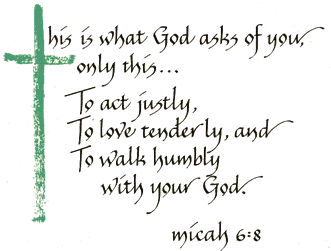catholicPittsburgh.org is the place for information, news, commentary, reflections and community building among the people of God who are renewing the Catholic Church in Western Pennsylvania.
More about us
Welcome ...
Partnering Groups
The following organizations are partners with catholicPittsburgh.org:
Listen for the Shepherd’s voice
Reflections on the Fourth Sunday of Easter
By David Moczulski, OFM
The readings for this Sunday:
We continue on our Easter pilgrimage this week with the Sunday readings on “The Good Shepherd.” This image has been a constant presence in both church art and literature through out the ages. God walks among the people and God cares for the people. We celebrate this year the memory of two very good shepherds in the church. This year marks the 25th anniversary of the martyrdom of Archbishop Oscar Romero (March 24). I was reading this week an account of the day of his death. As he presided at the Eucharist the responsorial psalm of the day was Psalm 23, David, the shepherd king, proclaims the God who is providing rest, nourishment, renewal for the flock. How appropriate that the last psalm Archbishop Romero prayed was this psalm of the good shepherd.
Archbishop Romero believed that his death would not be in vain, that the shepherd would rise in the people of El Salvador, and so he exercised his ministry with great confidence and courage. Believing that the kingdom of God “already present in mystery.”
We also celebrate the memory of Pope John Paul II. He too was one who looked to this image and modeled his ministry after the God who walks with and cares for his people. The editorial in this week’s edition of America describes John Paul as world leader, as a prophet for peace and justice, as a bridge-builder, reaching out especially to our Jewish brethren and our Orthodox sisters and brothers and a pilgrim. The editorial though states that John Paul considered himself most a teacher and pastor. My opinions and the pope were often not in agreement. There are things we would be in conflict about, yet, I cannot help but be moved by the presence in St. Peter’s Square of Jews, Muslims, Buddhists, Hindis, and other Orthodox traditions in the crowds. John Paul, the shepherd, who called the world religions together in Assisi, the home of the saint of peace, in death shepherd us together again.
Archbishop Romero and Pope John Paul were different in style, perhaps somewhat in theology, and in ministry, but they followed the model of both David’s and the writer of John’s gospel, of the God who is going out of God’s way to meet us.
As members of this human community, we are “dwelling in the house of the Lord” this very day. The Shepherd calls. We are called to attune our ears to recognize the voice. Today, God continues to send us shepherds, can you recognize God in those who are challenging you? The gospels continually tell us that Jesus called people by name. Jesus, the preeminent Shepherd, calls us by name. The name of Christian compels to live in solidarity with the people of the world. Not to build walls of division; but to be the ones building the bridges to connect us.
May the voice of Archbishop Romero never be silenced! May his spirit continue to rise in the lives of all of us who live in solidarity with the oppressed and with those whose voice goes unheard.
May the call of John Paul who challenges us to be not afraid, inspire to seek the shepherds who will guide us to the same solidarity for which Archbishop Romero freely gave his life.
David Moczulski, OFM is a Franciscan Friar of the Province of St. John the Baptist and lives in the Avalon area.
- By JoeMertz at Apr 13 2005 - 5:26pm
- Reflections
Micah 6:8

©1996 Cards by Anne
Used with permission
shepherds
Thanks David as I prepare a homily for this Sunday.
My struggle with the shepherd image evolves around the other image: that we are sheep. As we humans continue to make stupid decisions like thinking that violence will solve problems, I feel tempted to agree that we have not matured.
I also understand that shepherds in biblicals times were people who were not trusted; as one scholar put it: if you invited shepherds to your home, you might want to check to see if the silver is missing after they left; thus, shepherds being invited to be the first to visit the Holy Family continues Luke's message about the poor and powerless being called into intimate connection with the divine word.
The British novelist Ian McEwan said that ambivilence is much richer than certainty. So, shepherds join the long list of paradoxes and ambivilences.
Thanks, again, for pairing these two different leaders.
PS Were there female shepherds during bilical days?